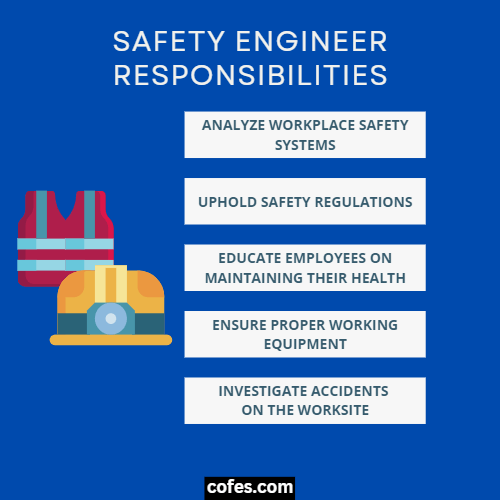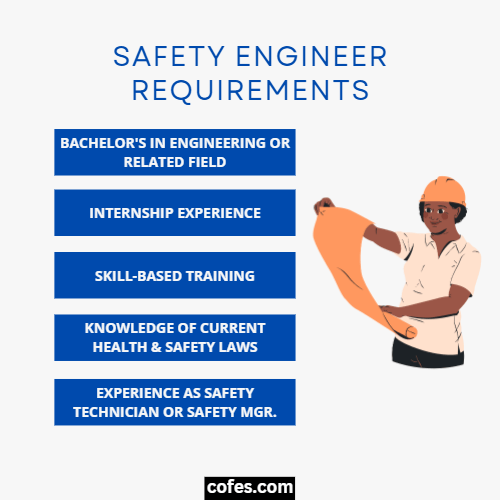A safety engineer is a rewarding career that offers high earning potential.
Safety engineers monitor workplaces, buildings, and machines to ensure safe operations.
They have to inspect these sites to guarantee no hazards or safety violations occur in product production or within the working area.
Safety engineers can also recommend improved safety measures by providing product recommendations, classes, or onsite training.
Here, we will break down all the information you need before beginning your journey to becoming a safety engineer.
Safety Engineer Job Information
| Official Job Title | Safety Engineer |
| Average Salary | $99,040 |
| Stress Level | Average-High |
| Work/ Life | Average-High |
| Job Satisfaction | High |
| Career Advancement | Average-High |
Safety Engineer Job Description
What is a Safety Engineer?
A safety engineer’s overarching responsibility is to maintain a worksite’s safety.
They ensure individuals in a workplace remain safe from potential injury and other health hazards through prevention, harm reduction, and eliminating any health threats.
Safety engineers report their job can be stressful at times, but those passionate about health and safety find it rewarding despite the occasional stressors.
Outside of necessary technical skills, having creativity and communication, critical thinking, observational, and problem-solving skills are crucial to anyone hoping to become a safety engineer.
What does a Safety Engineer do on a Daily Basis?
The daily activities of a safety engineer can span a wide variety of tasks.
Safety employees must stand on their feet for extended periods and are often required to travel.
All of their day-to-day tasks involve avoiding, lessening, and removing harmful situations in the workplace.
The working location of a safety engineer could range from a factory to a school.

Responsibilities, Duties & Roles of a Safety Manager
Some responsibilities of a safety engineer may include analyzing workplace safety systems, upholding safety regulations, educating employees on maintaining their health, ensuring proper working equipment (i.e., lighting, machines, ventilation), and investigating accidents occurring on the worksite, among many other safety-related duties.
Safety engineers are also responsible for recognizing, collecting, and testing potentially toxic materials.
These workers will create programs to teach worksite staff how to avoid injury and disease within the working environment.
It is vital for safety managers to collaborate across teams and departments to make sure every individual entering the workplace upholds all health and safety regulations.
Safety Engineer Salary
Average Salary
The average salary of a safety engineer is around $99,040.
Starting Salary
A safety engineer can typically expect a starting salary of approximately $52,515.
ZipRecruiter states that the ability of a safety engineer to travel frequently can lead to increased access to financial advancement within the industry.
Senior Salary
The health and safety industry offers safety engineers opportunities for advancement.
The most frequently reported senior salary falls around $121,122.
How to Become a Safety Engineer
The Entry Level: Certification, Training & Degree
As an entry-level safety engineer, you must have a bachelor’s degree in safety and health or another related field.
Common degrees for safety engineers are biology, engineering, chemistry, or another scientific or technical field.
As an individual advances in their safety career, most people obtain a master’s degree in related or specialized areas such as industrial hygiene or health physics.
Before entering the field, having internship experience is not required but increases your marketability and qualification for the job.
Other Skill Sets, Requirements & Qualifications
In addition to obtaining a degree from a higher educational institution, it is crucial for safety engineers to participate in various skill-based pieces of training.
It is essential that safety engineers remain up to date on health and safety laws and required inspection procedures.
Maintaining knowledge of machinery and technology used on a job site is also crucial.
Safety engineers oversee how employees utilize workplace devices, so they must always remain experts.
How Long Does it Take to Become a Safety Engineer?
Because a bachelor’s degree is often required to become a safety engineer, it usually takes at least four years to obtain the job.
If an individual decides to take on an internship, it will take a bit longer.
Getting a bachelor’s degree in a related field should position you well for landing the job.

Is It Hard to Become a Safety Engineer?
Safety inspections and general safety oversight are required for most industries, making a safety engineer career in continuous demand.
While obtaining your bachelor’s degree, joining professional organizations could help you network for jobs or internships that boost your qualifications upon graduating.
Some recommendations of such organizations are the American Society of Safety Engineers, the Safety and Health Institute, and the International Council on Systems Engineering.
Safety Engineer Career Path
The Safety Engineer Roadmap
A roadmap to becoming a safety engineer begins with completing your bachelor’s degree.
According to OSHA, the career trajectory often follows this path: safety specialist, safety trainer, safety technician, safety manager, safety consultant, and safety engineer.
Projections For Growth in Safety Engineer Jobs
The United States Bureau of Labor Statistics reports that “employment of health and safety engineers is projected to grow four percent from 2021 to 2031.”
In Summary: Is Safety Engineering a Good Career?
For people passionate about health and safety procedures, a safety engineer career is a promising career.
The responsibilities involved can cause employees to feel high-stress levels at times.
That said, there are plenty of opportunities for advancement that bring high salaries.
On average, safety engineers report beingly highly satisfied in their jobs, with Payscale scoring employee satisfaction at 4 out of 5 stars.
Safety Engineer Working Conditions
Can a Safety Engineer Work Remotely from Home?
In short, no.
Safety engineers must ensure employees uphold all health and safety regulations throughout the workplace.
This means the engineer must be on-site to complete the job requirements successfully.
How Many Hours Does a Safety Engineer Work?
On average, safety engineers typically work a 40-hour workweek.
However, overtime frequently occurs in this particular field.
Some safety engineers may also be required to participate in shift work, making their hours slightly more irregular than a typical 9-5 career.
Can a Safety Engineer Work Part-Time?
Yes.
Depending on the needs of an organization and the safety engineer’s employer, working part-time can be a possibility.
However, safety engineers often have to work overtime whenever an incident occurs, so be prepared to work additional hours, even part-time employees.
What are the Average Vacation Days of a Safety Engineer?
In the United States, a safety engineer can expect to receive a decent amount of vacation days, but the specific number varies wildly depending on the employer.
Alternative Careers & Similar Jobs to a Safety Engineer
- Supervisor
- Security Manager
- Heavy Equipment Operator
- Electrical Engineer
- Drafter
- Maintenance Engineer
- Engineering Technician
Safety Engineer Resume Tips
Four key tips for creating a safety engineer resume are highlighting relevant experience, showing applicable skills, quantifying achievements, and ensuring precise formatting from top to bottom.
A top priority of employers in health and safety is to seek out employees with previous hands-on experience.
Be sure to include all work and volunteering that proves your field expertise.
Include the basics: name, contact information, LinkedIn profile, education, experience, certifications, and additional skills.
Safety Engineer Interview Questions
Below are a few potential interview questions that recruiters ask safety engineer candidates.
We also define the purpose of the question to help you prepare for your first interview.
Q1: What is it like working on your own?
Why it works: Asking this question during an interview can examine personalities to determine if the candidate embodies optimism and high expectations.
Q2: What type of people do you work with most effectively?
Why it works: In opposition to the previous question, this question examines an individual’s ability to collaborate with others and in what capacity.
Safety engineers work across many different departments, so they must be able to work with others effectively.
Q3: What experience do you have with installing safety devices?
Why it works: Asking this question allows candidates to express the working knowledge necessary for the job.
When listening to someone’s answer, keep an ear out for the use of proper technical terms and industry jargon.
Using adequate terminology can show candidates have the skills they claim.
Jobs Related to Safety Engineer
- Construction and Building Inspectors
- Fire Inspectors
- Industrial Engineers
- Mining and Geological Engineers
- Occupational Health and Safety Specialist
- Occupational Health and Safety Technician
- Occupational Health and Safety Consultant
- Occupational Health and Safety Trainer
